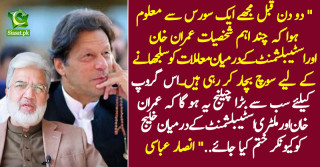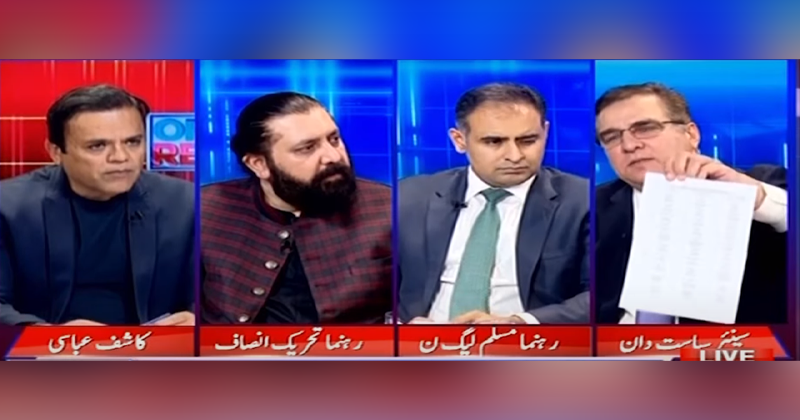I know what is cooking in your head......
Following is the complete Qur'anic Verse 4:59:
(
Qur'an 4:59) :
يَا أَيُّهَا الَّذِينَ آمَنُوا أَطِيعُوا اللَّهَ وَأَطِيعُوا الرَّسُولَ وَأُولِي الْأَمْرِ مِنكُمْ ۖ فَإِن تَنَازَعْتُمْ فِي شَيْءٍ فَرُدُّوهُ إِلَى اللَّهِ وَالرَّسُولِ إِن كُنتُمْ تُؤْمِنُونَ بِاللَّهِ وَالْيَوْمِ الْآخِرِ ۚ ذَٰلِكَ خَيْرٌ وَأَحْسَنُ تَأْوِيلًا
O ye who believe! Obey Allah, and obey the Messenger, and those charged with authority among you. If ye differ in anything among yourselves, refer it to Allah and His Messenger, if ye do believe in Allah and the Last Day: That is best, and most suitable for final determination. (Qur'an 4:59)
اے ایمان والو الله کی فرمانبرداری کرو اور رسول کی فرمانبرداری کرو اور ان لوگوں کی جو تم میں سے حاکم ہوں پھر اگر آپس میں کوئی چیز میں جھگڑا کرو تو اسے الله اور اس کے رسول کی طرف پھیرو اگر تم الله اور قیامت کے دن پر یقین رکھتے ہو یہی بات اچھی ہے اور انجام کے لحاظ سے بہت بہتر ہے
The Arabic word
ulil-amr ( أُولِي الْأَمْرِ ) is very comprehensive, which comprises all those persons who are in any way at the helm of the affairs of the Muslims-
religious scholars, thinkers, political leaders, administrators, judges of law courts, tribal chiefs and the like. In short, all those, who are in any way invested with authority from among the Muslims, are to be obeyed.
Sahih Bukhari 4584:
حَدَّثَنَا صَدَقَةُ بْنُ الْفَضْلِ، أَخْبَرَنَا حَجَّاجُ بْنُ مُحَمَّدٍ، عَنْ ابْنِ جُرَيْجٍ، عَنْ يَعْلَى بْنِ مُسْلِمٍ، عَنْ سَعِيدِ بْنِ جُبَيْرٍ، عَنْ ابْنِ عَبَّاسٍ رَضِيَ اللَّهُ عَنْهُمَا،
أَطِيعُوا اللَّهَ وَأَطِيعُوا الرَّسُولَ وَأُولِي الأَمْرِ مِنْكُمْ سورة النساء آية 59، قَالَ: ""نَزَلَتْ فِي عَبْدِ اللَّهِ بْنِ حُذَافَةَ بْنِ قَيْسِ بْنِ عَدِيٍّ، إِذْ بَعَثَهُ النَّبِيُّ صَلَّى اللَّهُ عَلَيْهِ وَسَلَّمَ فِي سَرِيَّةٍ"".
Narrated Ibn `Abbas: The Verse: Obey Allah and Obey the Apostle and those of you (Muslims) who are in authority. (4:59) was revealed in connection with `Abdullah bin Hudhafa bin Qais bin `Adi' when the Prophet appointed him as the commander of a Sariyya (army detachment).
آیت «أطيعوا الله وأطيعوا الرسول وأولي الأمر منكم» ”اللہ کی اطاعت کرو اور رسول ( صلی اللہ علیہ وسلم ) کی اور اپنے میں سے حاکموں کی۔“ عبداللہ بن حذافہ بن قیس بن عدی رضی اللہ عنہ کے بارے میں نازل ہوئی تھی۔ جب رسول اللہ صلی اللہ علیہ وسلم نے انہیں ایک مہم پر بطور افسر کے روانہ کیا تھا۔
Now, lets consider the remaining part of the verse (4:59):
فَإِن تَنَازَعْتُمْ فِي شَيْءٍ -------
If ye differ in anything among yourselves, refer it to Allah and His Messenger, ----
So, is this difference with Allah (Nauzobillah) --------------------------- No
with Rasool (pbuh) --------------------------------- No
with the one having authority over Muslims ------ Yes
Sahih Bukhari - 7144 :
حَدَّثَنَا مُسَدَّدٌ، حَدَّثَنَا يَحْيَى بْنُ سَعِيدٍ، عَنْ عُبَيْدِ اللَّهِ، حَدَّثَنِي نَافِعٌ، عَنْ عَبْدِ اللَّهِ رَضِيَ اللَّهُ عَنْهُ، عَنِ النَّبِيِّ صَلَّى اللَّهُ عَلَيْهِ وَسَلَّمَ، قَالَ: ""السَّمْعُ وَالطَّاعَةُ عَلَى الْمَرْءِ الْمُسْلِمِ فِيمَا أَحَبَّ وَكَرِهَ مَا لَمْ يُؤْمَرْ بِمَعْصِيَةٍ، فَإِذَا أُمِرَ بِمَعْصِيَةٍ فَلَا سَمْعَ وَلَا طَاعَةَ"".
TRANSLATIONS:
Narrated 'Abdullah: The Prophet said, "A muslim has to listen to and obey (the order of his ruler) whether he likes it or not, as long as his orders involve not one in disobedience (to Allah), but if an act of disobedience (to Allah) is imposed one should not listen to it or obey it.
نبی کریم صلی اللہ علیہ وسلم سے فرمایا ”مسلمان کے لیے امیر کی بات سننا اور اس کی اطاعت کرنا
ضروری ہے، ان چیزوں میں بھی جنہیں وہ پسند کرے اور ان میں بھی جنہیں وہ ناپسند کرے، جب تک اسے معصیت کا حکم نہ دیا جائے۔ پھر جب اسے معصیت کا حکم دیا جائے تو نہ سننا باقی رہتا ہے نہ اطاعت کرنا۔“
Sahih Muslim 4765 :
زبید نے سعد بن عبیدہ سے ، انہوں نے ابوعبدالرحمٰن سے ، انہوں نے حضرت علی رضی اللہ عنہ سے روایت کی کہ رسول اللہ صلی اللہ علیہ وسلم نے ایک لشکر بھیجا اور ایک شخص کو ان کا امیر بنایا ، اس ( امیر ) شخص نے آگ جلائی اور لوگوں سے کہا : اس میں داخل ہو جاؤ ۔ کچھ لوگوں نے اس میں داخل ہونے کا ارادہ کر لیا اور کچھ لوگوں نے کہا: ہم آگ ہی سے تو بھاگے ہیں ، پھر رسول اللہ صلی اللہ علیہ وسلم سے اس واقعے کا ذکر کیا گیا تو آپ نے ان لوگوں سے جو آگ میں داخل ہونا چاہتے تھے ، فرمایا : اگر تم آگ میں داخل ہو جاتے تو قیامت تک اسی میں رہتے ۔ اور دوسروں کے حق میں اچھی بات فرمائی اور فرمایا : اللہ تعالیٰ کی معصیت میں کسی کی اطاعت نہیں ، اطاعت صرف نیکی میں ہے۔
ENGLISH TRANSLATION:
It has been narrated on the authority of Abu 'Abd al-Rahman from 'Ali that the Messenger of Allah ( صلی اللہ علیہ وسلم ) sent a force (on a mission) and appointed over them a man. He kindled a fire and said:
Enter it. Some people made up their minds to enter it (the fire), (carrying out the order of their commander), but the others said: We fled from the fire (that's why we have come into the fold of Islam). The matter was reported to the Messenger of Allah ( صلی اللہ علیہ وسلم ). He said to those who Contemplated entering (the fire at the order of their commander): If you had entered it, you would have remained there until the Day of Judgment. He commanded the act of the latter group and said: There is no submission in matters involving God's disobedience or displeasure.
Submission is obligatory only in what is good (and reasonable).
Sahih Muslim 4765
Now, Shia bring this verse 4:59 to support their Aqeedah e Imamat:
Following is an example of their wrong Aqeedah about Obligatory Immamat:
"I asked Abu 'AbdAllaah (as-Sadiq) about the words of Allaah : 'Believers, obey Allah, His Messenger, and your leaders (who possess Divine Authority). . . .' (4:59) "The Imam said, 'This was sent from the heavens about `Ali ibn Abi Taalib, Al-Hasan and Al-Hussain...."
Source:
al-Kulayni in his al-Kafi, volume 1, pages 286–288, hadeeth #1
Now comming back to my previous paragraph, lets consider the remaining part of the verse (4:59):
فَإِن تَنَازَعْتُمْ فِي شَيْءٍ -------
If ye differ in anything among yourselves, refer it to Allah and His Messenger, ----
So, is this difference with Allah (Nauzobillah) --------------------------- No
with Rasool (pbuh) --------------------------------- No
with the one having authority over Muslims ------ Yes
If we apply the meaning to the word
ulil-amr ( أُولِي الْأَمْرِ ) as understood by Shia brothers then according to their wrong believe their Imam is “infallible” (ma‘sum):
Imaam Al-Saadiq (عليه السلام) said:“...He is the remainder from Aadam (عليه السلام), the best (ones) from the progeny of Nooh (عليه السلام), the chosen one from the family
(ahl) of Ibraaheem (عليه السلام), and the offspring from Ismaa`eel, and the elite (ones) from the lineage
(`itrah) of Muhammad (صلى الله عليه وآله وسلم), He has always been looked after by the eyes of Allaah who protects him and guards him with his curtain, he is expelled from the ropes of Iblees, and he is a solder he pushes away from approaching twilight. And all immorality
(fisq) and evil is discharged from him, he is free deformities, he is veiled from diseases, he is ma`soom from (any) minor sin, and he is preserved from all (types) of filth
(fawaaHish)...”
Source: Al-Kulayni,
Al-Kaafi, vol. 1, Kitaab Al-Hujjah, Ch. 15, hadeeth # 2, pg. 203 - 205
Since, according to Shia's wrong believe that their Imam is “infallible” (ma‘sum), hence the verse 4:59 could not be applied to Shia believe since their Imam is “infallible” (ma‘sum) and hence can not make any mistake so that he has to be referred back to Allah and his Messenger (pbuh).







































